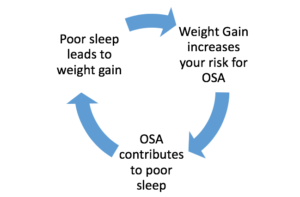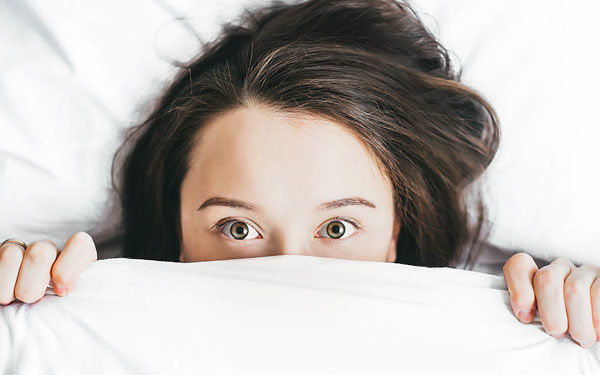Sleep is an invaluable part of our daily lives. However, we often overlook the impact of sleep on our overall health, including weight. Sleep impacts weight in important ways, in fact research has identified that short sleep duration and poor sleep quality are risk factors for the development of obesity. Sleep loss impacts weight by increasing hunger, appetite, and cravings, elevating blood sugar, and reducing energy expenditure. The combination of feeling tired and experiencing cravings also makes it difficult to make and maintain a balanced diet and exercise.
What contributes to sleep loss?
- Sleep loss may occur due to poor habits when preparing for sleep, known as sleep hygiene.
- Sleep loss may also occur due to medical conditions that disturb sleep, such as obstructive sleep apnea (OSA).
 OSA involves repeated episodes of upper airway obstruction during sleep, which results in lower blood oxygenation, activation of the body’s stress response, increased sleep fragmentation and chronic sleep loss. OSA and weight have a bidirectional relationship that can manifest into a problematic cycle. The good news is that you can break this cycle by addressing weight, sleep functioning or both.
OSA involves repeated episodes of upper airway obstruction during sleep, which results in lower blood oxygenation, activation of the body’s stress response, increased sleep fragmentation and chronic sleep loss. OSA and weight have a bidirectional relationship that can manifest into a problematic cycle. The good news is that you can break this cycle by addressing weight, sleep functioning or both.
If you are concerned that you may have OSA you can complete a brief self-evaluation here.
Improving sleep hygiene is a powerful way to improve sleep and begin to break the cycle between sleep loss and weight gain. Here are some tips for improving sleep hygiene:
- Be consistent. Going to bed and getting up at the same time every day (even on weekends!) helps to train your body to find a regular rhythm of sleeping and waking.
- Get up and try again. If you have been awake in bed for more than 20 minutes, get up and do a calming or boring activity until you begin to feel sleepy, then return to bed and try again. For example, read something boring like the dictionary. Be sure to keep lighting as dim as possible and avoid stimulating activities.
- Eat well. Following a healthy, balanced diet aids sleep functioning. The timing of meals is also extremely important, a large meal soon before bed can interrupt sleep, so try to eat dinner at least 3 hours before bedtime.
- Develop your sleep ritual. Follow a consistent pattern of activities every night to prepare for sleep. For example, having a hot bath, washing your face, doing deep breathing or stretching exercises before bed each night helps signal to your body that it’s time to sleep.
- Avoid mood altering substances, such as caffeine, nicotine and alcohol. Stimulants such as caffeine and nicotine interfere with the ability to fall asleep, so abstain from consuming them at least 4-6 hours before bedtime. Similarly, it is best to avoid consuming alcohol at least 4-6 hours before going to bed, as alcohol significantly interrupts the quality of sleep.
- Limit naps. Naps can interrupt the natural sleep wake cycle, so it is best to avoid taking naps (even when very tired) to make sure that you are tired for bedtime.
 Brittany Speed is a Clinical Psychology Ph.D. candidate at Stony Brook University. She is completing her predoctoral internship training through Stony Brook University’s Consortium Internship Program, which includes specialized training in behavioral health and weight management. Before attending Stony Brook,Brittany obtained her bachelor’s degree from the University of British Columbia in psychology. Her clinical and research interests include understanding in the role of dimensional, transdiagnostic factors, such as emotion dysregulation, stress, and personality, in the development and maintenance of clinical problems.
Brittany Speed is a Clinical Psychology Ph.D. candidate at Stony Brook University. She is completing her predoctoral internship training through Stony Brook University’s Consortium Internship Program, which includes specialized training in behavioral health and weight management. Before attending Stony Brook,Brittany obtained her bachelor’s degree from the University of British Columbia in psychology. Her clinical and research interests include understanding in the role of dimensional, transdiagnostic factors, such as emotion dysregulation, stress, and personality, in the development and maintenance of clinical problems.







Leave A Comment
You must be logged in to post a comment.